Iranian paper praises Zelensky for Trump confrontation
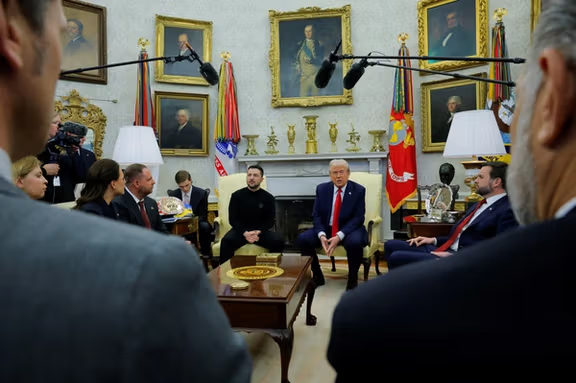
Iran's establishment daily called Ukrainian President Volodymyr Zelensky’s showdown with US President Donald Trump a victory and an example of talking but not conceding to Washington.

Iran's establishment daily called Ukrainian President Volodymyr Zelensky’s showdown with US President Donald Trump a victory and an example of talking but not conceding to Washington.
"Zelensky's victorious confrontation with Trump showed that one can negotiate with the devil and prevail. It is not the case that every negotiation leads to concessions," the newspaper wrote in an editorial on Sunday, praising the Ukrainian leader’s defiance during a tense Oval Office meeting on Friday.
"Some believe negotiation with America is futile. But Zelensky demonstrated that with courage and clarity, one can not only resist pressure but emerge triumphant," it added.
The paper said that while Trump and his team attempted to corner Zelensky, pressuring him to accept a peace plan favorable to both Moscow and Washington, “Instead, Zelensky removed the mask from Trump's face" and publicly accused the US of falling for Russian deception. "The arrogance Trump displayed was shattered by Zelensky's frank and courageous behavior."
Shortly after the meeting between Trump and Zelensky made international headlines, the office of Iran's Supreme Leader seized the moment to revive his warnings about reliance on the West.
Ali Khamenei's official X account reposted his 2022 remarks on Ukraine. "The first lesson from the situation in Ukraine is that Western support for countries and governments that are their puppets is a mirage," it said. "All governments must understand this. Those governments relying on the US and Europe should look at the current situation in Ukraine."
Khamenei has banned diplomatic talks with the US, in spite of support from the likes of the country's president. Last month the Supreme Leader called negotiations "neither wise, nor intelligent, nor honorable."
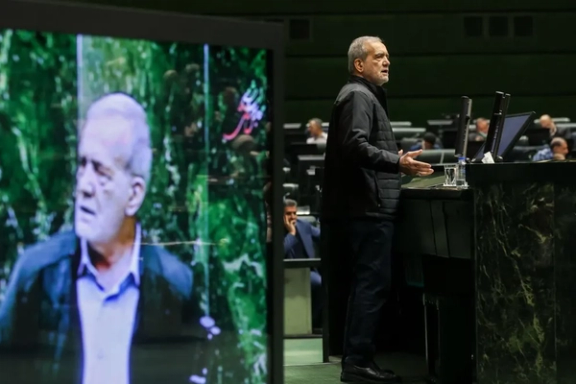
The Iranian president told parliament on Sunday that he initially supported negotiations with the United States but deferred to Supreme Leader Ali Khamenei’s position against engaging in talks.
“I believed it was better to engage in dialogue, but when the Leader said we would not negotiate with the US, I said, ‘We will not negotiate with the US, period,’” Masoud Pezeshkian said.
He added that government policy must align with Supreme Leader Ali Khamenei’s stance on the issue.
Khamenei, the country's ultimate decision-maker, rejected the idea of talks with Trump last month, calling them "neither wise, nor intelligent, nor honorable."
Speaking during the impeachment session of Minister of Economy Abdolnaser Hemmati, Pezeshkian described the challenges his administration faced upon taking office.
“When we took over the government, there was an imbalance in water, gas, electricity, and money,” he said, referring to the country's shortages.
Critics of Hemmati’s economic policies attribute the skyrocketing dollar exchange rate, rising food prices, and overall inflation to his leadership. The US dollar has surged to 940,000 rials, placing severe strain on households and businesses.
Addressing broader geopolitical issues, Pezeshkian likened the current situation to wartime conditions, citing incidents such as the killing of former Hamas leader Ismail Haniyeh on the first working days of his government and developments in Syria and Lebanon.
“We are in a full-scale war and must adopt a wartime posture... Today’s war is worse and more difficult than the war with Iraq,” he said.
He also referenced US sanctions on Iranian shipping, adding, “Trump imposed extensive sanctions on our ships, and now they are stuck, unable to unload their cargo... Qatar, Iraq, Turkey, and many other countries are not returning our dollars.”
During the impeachment hearing, lawmakers in favor of Hemmati’s removal argued that his policies had worsened the economic crisis.
One of these critics, MP Jabar Kouchaki-Nejad, criticized the government’s economic team, saying their performance had affected all social classes.
“Hemmati explicitly told us that the issues of currency depreciation and inflation have nothing to do with him,” Kouchaki-Nejad said.
MP Rouhollah Izadkhah also pointed out that the national currency had lost 62% of its value in a few months, while Rasoul Bakhshi Kouhpayeh pointed out that the exchange rate of the US dollar in Iran had increased 13,000 times over the past 50 years.
Hemmati defended his record, arguing that inflation had fallen by 10% under his tenure. “Seventy percent of the government’s expenses are covered through taxes. In the past month alone, the tax organization has collected 1700 trillion rials ($1.8 billion) in revenue,” he said.
He dismissed accusations that the government deliberately increased the exchange rate, saying, “The dollar rate is not real, and we will certainly bring it down.”
Some commentators, analysts and media outlets in Iran have pointed out in recent months that without a deal with the US and removal of sanctions the economy cannot improve. Some have also argued that impeaching a minister would not help to improve the situation.
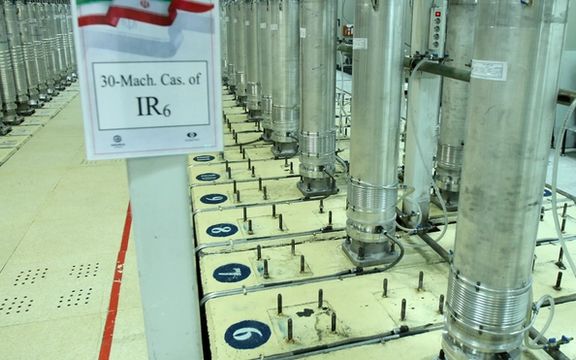
The Israeli ambassador to the US, Yechiel Leiter, warned that Iran is rapidly advancing its nuclear program while refusing to cooperate with the nuclear watchdog, arguing that diplomatic efforts to contain Tehran have failed.
“Right now we’re at a pivotal moment because Iran is racing forward in the nuclear program,” Leiter said in an interview with Fox News, pointing to the upcoming March 3 meeting of the International Atomic Energy Agency (IAEA).
“They’re supposed to produce a report on Iranian progress, but they won’t be able to because Iran doesn’t really cooperate with the IAEA.”
In 2023, Iran banned around one third of the IAEA's inspectors and the IAEA's chief, Rafael Grossi, said last month, “Iran is not still cooperating as we would like them to do.”
Leiter accused Iran’s leadership of lying about its nuclear ambitions and dismissed diplomatic efforts. “These people are liars. They’re charming liars. But they lie,” he said.
He added that Iran has openly declared its intention to destroy Israel and warned that its missile attacks on Israeli cities were part of a broader campaign against the West.
“They call us the little Satan. The United States is the big Satan. And they’re coming for Western civilization as a whole," he said.
He dismissed efforts to negotiate with Iran, saying, “You can’t talk Iran out of this.” He contrasted the Trump administration’s approach with prior US policies, praising former President Donald Trump for withdrawing from the 2015 nuclear deal.
“There’s real clarity on the Iranian situation within the Trump administration,” he said, emphasizing strong coordination between Trump and Israeli Prime Minister Benjamin Netanyahu.
Leiter's remarks come amid growing concerns over Iran’s uranium enrichment program.
Last Wednesday, the IAEA found that Iran's stock of near-bomb-grade uranium has risen to levels which in principle could be refined further into the equivalent of six nuclear bombs, according to a Reuters report citing confidential IAEA files.
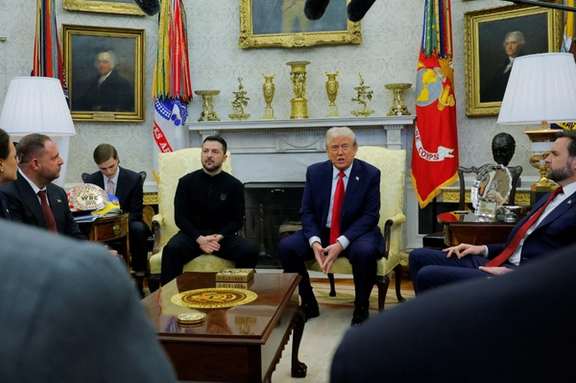
Shortly after the Oval Office blowout between the presidents of Ukraine and the United States, the office of Iran's Supreme Leader reposted his 2022 criticism of Ukrainians' reliance on Washington.
"The first lesson from the situation in Ukraine is that Western support for countries and governments that are their puppets is a mirage," the post on Ali Khamenei's X account quotes him as saying in Ukrainian.
"All governments must understand this. Those governments relying on the US and Europe should look at the current situation in Ukraine," the post reads, citing his remarks from March 1, 2022.
Khamenei's office reposted his old comments in reaction to Friday’s controversial meeting between US President Donald Trump and his Ukrainian counterpart Volodymyr Zelensky, in an apparent effort to vindicate his longtime opposition to the West, and the US in particular.
Over the past few hours, many Iranian hardliners have claimed that the Trump-Zelensky blowout validates Khamenei’s opposition to negotiations with the United States.
Citing Khamenei’s early February speech, in which he declared negotiations with the Trump administration would not be “wise, expedient, or dignified,” they argue that Trump's confrontational exchange with Ukrainian President Volodymyr Zelensky in the Oval Office should serve as a warning to those who question Khamenei’s stance.
On social media, hardliners have also extensively highlighted Khamenei’s warnings in the past about direct talks with the United States and his criticism of Trump for not abiding by the commitments the US had made in the 2015 JCPOA nuclear deal and re-imposition of sanctions on Iran in 2018.
Following the Oval Office incident, some reformist politicians and commentators—who have generally supported direct talks with the United States—also voiced skepticism about the viability of negotiations with the Trump administration.
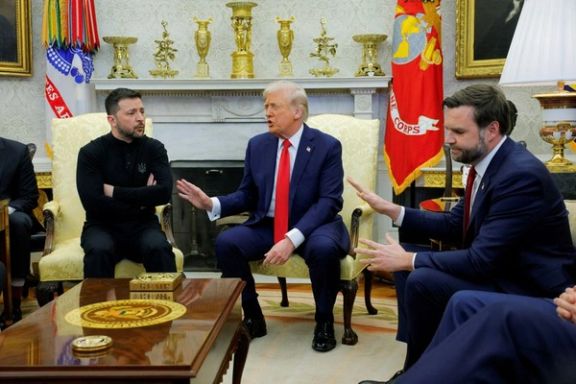
Iranian hardliners claim that Friday’s controversial meeting between the US and Ukrainian presidents validates Supreme Leader Ali Khamenei’s opposition to negotiations with the United States.
Referring to Khamenei’s early February speech, where he said negotiations with the Trump administration would not be “wise, expedient, or dignified,” they argue that Trump's confrontational exchange with Ukrainian President Volodymyr Zelensky in the Oval Office should serve as a warning to those who question Khamenei’s stance.
“Can an Iranian even imagine our president in Zelensky’s position?” Abdollah Ganji, a former editor of the IRGC-linked Javan newspaper, wrote in an X post, referencing Trump’s remark during the meeting that Zelensky was in no position to dictate terms because he didn’t have the right cards in hand.
Khamenei’s political adviser and former secretary of Iran's Supreme National Security Council, Ali Shamkhani, shared photos of Khamenei’s June 2019 meeting with the late Japanese Prime Minister Shinzo Abe, during which Khamenei refused to accept a message Abe was delivering from Trump.
On social media, hardliners and ultra-hardliners have also extensively highlighted Khamenei’s warnings in the past about direct talks with the United States and his criticism of Trump for not abiding by the commitments the US had made in the 2015 JCPOA nuclear deal and re-imposition of sanctions on Iran in 2018.
Incident disappoints advocates of talks with US
Iranian President Masoud Pezeshkian said in a speech on Thursday that Tehran was open to talks with Washington but would not “bow to bullies.” However, he also stressed that without the lifting of US sanctions, there could be no economic improvement.
Following Friday’s Oval Office incident, some reformist politicians and commentators—who have generally supported direct talks with the United States—also voiced skepticism about the viability of negotiations with the Trump administration.
Mohammad-Ali Abtahi, a former vice president under reformist President Mohammad Khatami, dismissed negotiations with Trump as futile. “Trump and the America of Trump are not parties we can negotiate with,” he tweeted. “Imagine Pezeshkian sitting across from him—talking to this man won’t help the Iranian people.”
Reformist commentator Fayyaz Zahed condemned Trump’s public rebuke of Zelensky, likening it to “a return to the era of imperialism.” He remarked, “The real America is what we are witnessing.”
Former political prisoner Hossein Ronaghi's tweeted:
Calls for strategic decision-making
Despite the backlash, some Iranian analysts argue that the incident underscores the urgency of determining when and how to engage in negotiations with the US before Iran loses all bargaining power.
“The humiliating exchange between Zelensky and Trump proved that negotiations must happen while there are still cards left to play,” argued Diako Hosseini, a political commentator and deputy chairman of the Tehran Chamber of Commerce, in an X post. “One should never enter talks under any other circumstances.”
In a lengthy thread, Mohammad Rahbari, another political commentator in Tehran, argued that the lesson Iran should take from the standoff between Trump and Zelensky for Iran is to look at international relations from a different perspective in the current circumstances. Warning against “obstinacy,” he argued that Iran should remain cautiously open to negotiations to avoid “falling victim to bigger powers.”
"Trump has not, and will not, pursue abstract goals... He knows how to calculate and knows numbers. Smart behavior towards him means proposals that are of mutual benefit, precise and clear!" Ali Asghar Sahfieian, managing director of the reformist news website Ensaf News, argued in a tweet.
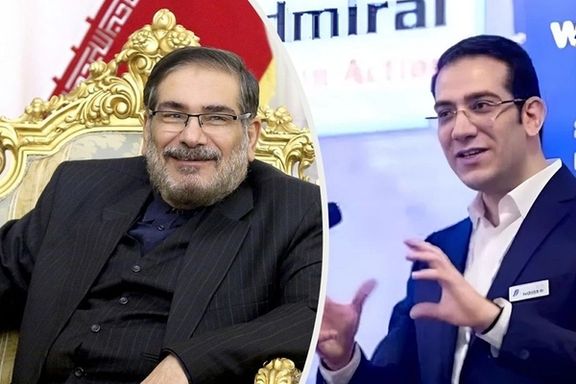
The lawyer for the son of a key figure in Iran’s ruling elite says they have filed a lawsuit against Bloomberg over a report alleging his involvement in Iranian oil trade linked to Russia and global energy markets.
However, the lawyer, as quoted by Iranian media, did not specify where or when the lawsuit was filed. Iran International has not independently verified whether the lawsuit has actually been filed.
Hossein Shamkhani, the son of former security chief Ali Shamkhani, is at the center of the controversy. In December 2024, Ali Shamkhani, who served as secretary of the Supreme National Security Council (SNSC) from 2013 to 2023, declared himself a key decision-maker on Iran's global strategy and nuclear diplomacy.
ILNA published the interview on Saturday, in which the lawyer rejected Bloomberg’s reporting on Milavous Group Ltd., a company that Bloomberg reported had a financial turnover of $15 billion in 2022 and was part of Shamkhani’s business network.
The lawyer, who was not named, dismissed Bloomberg’s reporting as "completely fabricated", saying: "Mr. Shamkhani is neither the owner nor a shareholder of Milavous Group, and the numbers Bloomberg published are pure fiction. If they had any proof, they would have published it by now."
"We have taken legal action against Bloomberg for publishing false and baseless accusations against Mr. Shamkhani. They have provided no evidence to support their reporting, despite repeated requests," the lawyer told ILNA.
Bloomberg’s investigation described Milavous Group as a major player in the global oil market, allegedly engaged in blending and rebranding crude oil from Iran and Russia to obscure its origins. According to the report, sources familiar with the matter said that Shamkhani oversaw a sprawling web of interconnected businesses facilitating illicit Iranian oil sales. The report also noted that Milavous and other companies in Shamkhani’s network supply oil to major buyers, including China’s Sinopec, Chevron in the US, and BP in the UK.
However, Shamkhani’s unnamed lawyer said the financial claims about Milavous were inaccurate.
"We obtained financial records for Milavous Group, audited by an American firm, and they show that the company's turnover was just $9.2 million in 2022 and around $9.9 million in 2023. These figures are nowhere near what Bloomberg published," the lawyer said.
The Bloomberg report also noted that while Hossein Shamkhani has not been sanctioned, some of the vessels believed to be under his control had been blacklisted by the US Treasury. The investigation cited multiple unnamed sources alleging that Shamkhani’s network had deep ties to both Iranian and Russian oil markets, benefiting from the lack of direct sanctions against him.
Additionally, in December, Bloomberg reported that Hossein Shamkhani plays a key role in the supply of Iranian arms to Russia, citing more than a dozen unnamed US, UK, and European officials, as well as individuals with direct knowledge of his activities.
Despite these allegations, both Shamkhani and Milavous have denied any wrongdoing. A separate lawyer representing Shamkhani previously told Bloomberg that the allegations were "baseless and lacking supporting evidence." Similarly, Milavous Group's managing director, Mohamed Al Hashmi, dismissed any connection to Shamkhani or involvement in Iranian or Russian oil trading.
Shamkhani’s legal team now insists that the lawsuit will hold Bloomberg accountable for what they describe as "irresponsible and false reporting."